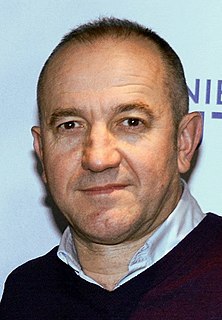A Quote by C. S. Lewis
When you give up a bit of work don't (unless it is hopelessly bad) throw it away. Put it in a drawer. It may come in useful later. Much of my best work, or what I think my best, is the re-writing of things begun and abandoned years earlier.
Related Quotes
The best advice I can give on this is, once it's done, to put it away until you can read it with new eyes. Finish the short story, print it out, then put it in a drawer and write other things. When you're ready, pick it up and read it, as if you've never read it before. If there are things you aren't satisfied with as a reader, go in and fix them as a writer: that's revision.
I think if you talk to the experts in any field where you have to take on a unknown challenge, where you're going to be working on it for a long time you'd find that to work themselves up to their best performance and really throw themselves into it, you know, spend all these hours in there and ah, give it their... give it their best that optimism plays a role.
Lucky accidents seldom happen to writers who don't work. You will find that you may rewrite and rewrite a poem and it never seems quite right. Then a much better poem may come rather fast and you wonder why you bothered with all that work on the earlier poem. Actually, the hard work you do on one poem is put in on all poems. The hard work on the first poem is responsible for the sudden ease of the second. If you just sit around waiting for the easy ones, nothing will come. Get to work.
I think that whether you've just begun writing or whether you've been writing for fifty years - I mean, I'm excited to get there and tell you about it when I do - I think that there's always the challenge of believing in yourself enough to get the work done and not being so taken with yourself that you're unwilling to continue to work on the work.
I often think that all the difficulties we encounter only give us the more strength if we keep hold of our work, and we must not now give up while in the prime of life. It is best to keep trying, and by and by the opportunity will come. If we have given up, then we shall not be ready for it when it does come.
When you come to a hotel room, you want it to be grand, functional and beautiful. But you don't want things that are not useful. Sometimes you go to hotels and there are all these frames and pictures of people you don't know, and you end up hiding everything in the drawer, and then housekeeping come and put it out again.
In general, I feel, or I have come to feel, that the richest writing comes not from the people who dedicate themselves to writing alone. I know this is contradicted again and again but I continue to feel it. They don't, of course, write as much, or as fast, but I think it is riper and more satisfying when it does come. One of the difficulties of writing or doing any kind of creative work in America seems to me to be that we put such stress on production and material results. We put a time pressure and a mass pressure on creative work which are meaningless and infantile in that field.
The most obvious – and easiest! – way to gain perspective is to put your work away for a while.
The truth is, we don’t know how taking a break frees up the mind, but it does: Somehow it freshens our little neurons, or perhaps it prompts the brain to create more cleverness molecules.
If you can bear to let a short piece sit a week and a book-length work a month, do so. Longer is fine, too; some authors have abandoned manuscripts for years before unearthing them and realizing, ‘Hey, this isn’t bad,’ and renewing their energy for the project.





































